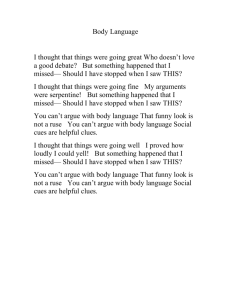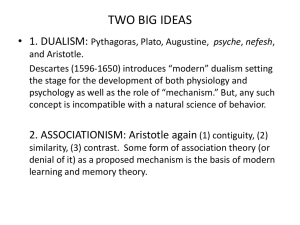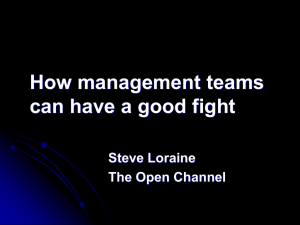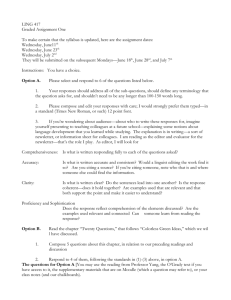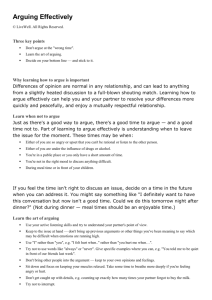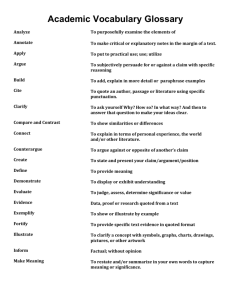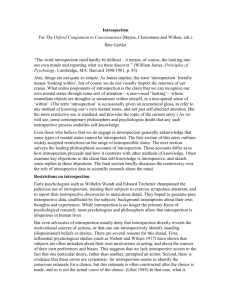Schedule - University of Iowa
advertisement
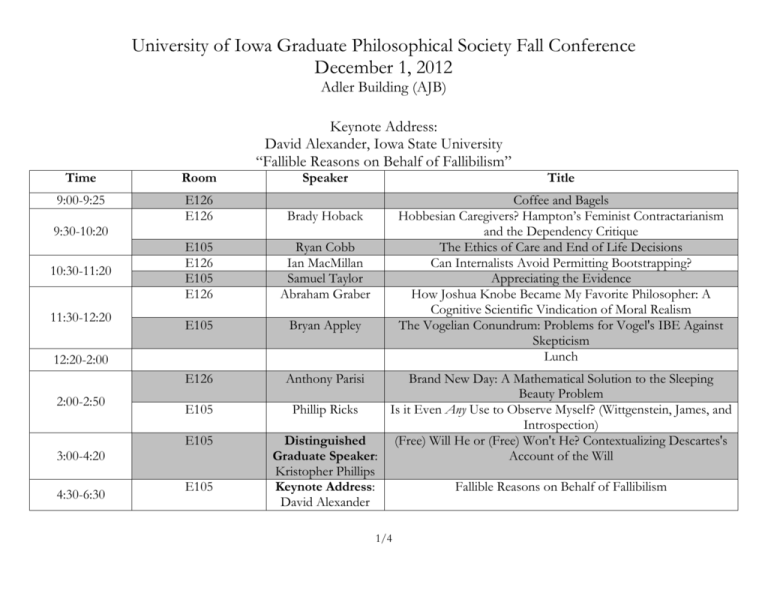
University of Iowa Graduate Philosophical Society Fall Conference December 1, 2012 Adler Building (AJB) Keynote Address: David Alexander, Iowa State University “Fallible Reasons on Behalf of Fallibilism” Time Room Speaker 9:00-9:25 E126 E126 Brady Hoback E105 E126 E105 E126 Ryan Cobb Ian MacMillan Samuel Taylor Abraham Graber E105 Bryan Appley E126 Anthony Parisi Title Coffee and Bagels Hobbesian Caregivers? Hampton’s Feminist Contractarianism and the Dependency Critique The Ethics of Care and End of Life Decisions Can Internalists Avoid Permitting Bootstrapping? Appreciating the Evidence How Joshua Knobe Became My Favorite Philosopher: A Cognitive Scientific Vindication of Moral Realism The Vogelian Conundrum: Problems for Vogel's IBE Against Skepticism Lunch 9:30-10:20 10:30-11:20 11:30-12:20 12:20-2:00 2:00-2:50 3:00-4:20 4:30-6:30 E105 E105 E105 Brand New Day: A Mathematical Solution to the Sleeping Beauty Problem Phillip Ricks Is it Even Any Use to Observe Myself? (Wittgenstein, James, and Introspection) Distinguished (Free) Will He or (Free) Won't He? Contextualizing Descartes's Graduate Speaker: Account of the Will Kristopher Phillips Keynote Address: Fallible Reasons on Behalf of Fallibilism David Alexander 1/4 Graduate Paper Abstracts (In Alphabetical Order by Speaker’s Last Name) Speaker Title Abstract Bryan Appley The Vogelian Conundrum: Problems for Vogel's IBE Against Skepticism Ryan Cobb The Ethics of Care and End of Life Decisions Abraham Graber How Joshua Knobe Became My Favorite Philosopher: A Cognitive Scientific Vindication of Moral Realism Vogel makes an interesting IBE against skepticism that centers around a certain necessity about the world and that, in the real world hypothesis (RWH), this necessity explains certain regularities in experience that must be explained with appeal to contingent principles in skeptical competitors to the RWH (thus making skeptical competitors less simple for the same explanatory power). In this paper I will argue that (1) granting an RWH and this necessity, one still falls short of an explanation of this regularity in experience, (2) it might not even be possible for human beings to imagine (let alone experience in sensation) a phenomenological state that would go against this regularity in experience thus rendering Vogel's explanation unneeded, and (3) that it will be difficult to think of new necessities that don't either fall to these worry or end up being just as well accounted for by what we will call the imaginative demon hypothesis (IDH). How does the ethics of care inform end of life decisions? In this paper, I argue that we should separate, so far as possible, the notions of treatment and care. I then argue that there are ethical reasons to never withdraw care from dying patients, even in cases where withdrawing treatment is permissible. I also contend that we have these reasons, even if we do not endorse wholesale acceptance of the ethics of care. I will argue that recent work by Joshua Knobe puts the realist in a position to offer a compelling abductive argument in support of the existence of robust moral properties. If Knobe is right, one can only accept moral antirealism if one is also willing to be a reductive materialist in the philosophy of mind. 2/4 Brady Hoback Hobbesian Caregivers? Hampton’s Feminist Contractarianism and the Dependency Critique Ian MacMillan Can Internalists Avoid Permitting Bootstrapping? Anthony Parisi Brand New Day: A Mathematical Solution to the Sleeping Beauty Problem It is well known that social contract theories have difficulty accommodating dependency relations within their accounts of social justice. At first blush, Jean Hampton’s feminist contractarianism appears no different in this respect; referring to a relationship between people of radically unequal capacities, Hampton says, “so long as this radical inequality prevails, such a relationship is outside the province of justice." This claim makes it prima facie implausible to suggest that Hampton’s feminist contractarianism has the resources to include dependents in a theory of justice. However, I will argue that Hampton’s view need not exclude dependency relations. An inference exhibits bootstrapping when at least one of the premises is formed using a source that the conclusion says is legitimate. Advocates of internalist analyses of epistemic justification have objected to their externalist counterparts on the grounds that the latter mistakenly permit one to be justified in believing the conclusion of a bootstrapping inference. Externalists have replied with a tu quoque: internalists also cannot avoid permitting bootstrapping. In this paper I consider the work of arguably the two most prominent internalist proponents of this objection, Jonathan Vogel and Richard Fumerton. I argue that Vogel's position is doubly problematic. First, his proposal fails to adequately explain the problematic nature of bootstrapping. Second, his proposal is equally available to externalists and so cannot provide him with grounds for preferring internalism to externalism. I go on to consider Fumerton's version of foundationalism that purports to provide a way of blocking bootstrapping that is only available to internalists. I argue that Fumerton is able to avoid using bootstrapping inferences in practice but is unable to avoid permitting their use in theory. The main lesson is that bootstrapping is a problem for everyone or no one. Adam Elga initially used the Sleeping Beauty Problem as an attempted counter-argument to Bas Van Frassen's Reflection Principle. Other thinkers have since debated the validity of this thought experiment as a refutation of the reflection principle. I will present some of these solutions, argue that in many cases the problem is mathematically ill-formed, and present what I take to be a mathematical proof that the Sleeping Beauty Problem is not an effective counter-argument to the Reflection Principle. 3/4 Kristopher Phillips (Distinguished Graduate Speaker) (Free) Will He or (Free) Won't He? Contextualizing Descartes's Account of the Will Phillip Ricks Is it Even Any Use to Observe Myself? (Wittgenstein, James, and Introspection) Samuel Taylor Appreciating the Evidence My aim is to establish that the literature regarding Descartes’s account of the freedom of the will ignores his modal commitments and is, as such, ignoring an important feature of Cartesian thought immediately relevant to the issue at hand. The textual evidence regarding Descartes’s view of freedom is indeterminate; this fact necessitates a closer look at Descartes’s broader theory of possibility and necessity. I will argue here that the best interpretation of Descartes’s views on freedom matches his views on modality, and that the correct view of Cartesian modality is quietism. I will survey the various interpretive approaches to Cartesian modality and argue that only two strategies are plausible: quietism and actualism. I will then briefly sketch an argument for quietism as Descartes’s considered view in both modality and human freedom. This paper will provide a discussion of the use of self-observation in Ludwig Wittgenstein’s Remarks on the Philosophy of Psychology, volumes I & II, and William James’ notion and use of introspection in Principles of Psychology, volumes I & II, especially the chapters on “Habit” and “Will.” It will mainly focus on the nature of introspection, the differences between introspection and other kinds of observation, the uses of introspection in James’ psychology, Wittgenstein’s responses to James’ use of introspection in Principles, and whether or not careful self-observation has any practical uses, and if so what they might be. Evidentialism is roughly the view a subject's belief that p is justified iff the (total) evidence S possesses at the time supports p. This, however, is no more than a sketch of a theory until we have an ontology of evidence, criteria for possession of evidence, and an account of evidential support. This paper presents a sketch of a theory concerning the ontology of evidence and criteria for possession of evidence. Regarding the former, I argue that evidence consists of facts (truth-makers) rather than propositions (truth-bearers). Regarding the latter, I develop what I call a "use" theory of evidence possession and draw out a number of surprising implications of the view. I conclude my paper with a general discussion of two advantages for the view I sketch: (i) it can unify (at a high-level) our concepts of personal evidence, scientific evidence, legal evidence, etc.; and (ii) it makes sense of an insight from Richard Fumerton's inferential internalism while avoiding the infamous Lewis Carroll regress. 4/4
